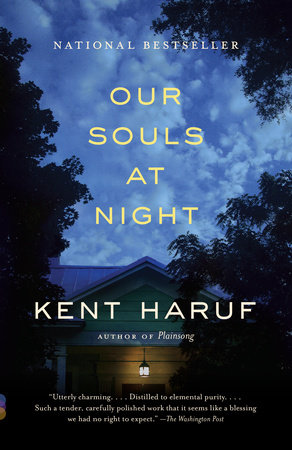1
And then there was the day when Addie Moore made a call on Louis Waters. It was an evening in May just before full dark.
They lived a block apart on Cedar Street in the oldest part of town with elm trees and hackberry and a single maple grown up along the curb and green lawns running back from the sidewalk to the two-story houses. It had been warm in the day but it had turned off cool now in the evening. She went along the sidewalk under the trees and turned in at Louis’s house.
When Louis came to the door she said, Could I come in and talk to you about something?
They sat down in the living room. Can I get you something to drink? Some tea?
No thank you. I might not be here long enough to drink it. She looked around. Your house looks nice.
Diane always kept a nice house. I’ve tried a little bit.
It still looks nice, she said. I haven’t been in here for years.
She looked out the windows at the side yard where the night was settling in and out into the kitchen where there was a light shining over the sink and counters. It all looked clean and orderly. He was watching her. She was a good-looking woman, he had always thought so. She’d had dark hair when she was younger, but it was white now and cut short. She was still shapely, only a little heavy at the waist and hips.
You probably wonder what I’m doing here, she said.
Well, I didn’t think you came over to tell me my house looks nice.
No. I want to suggest something to you.
Oh?
Yes. A kind of proposal.
Okay.
Not marriage, she said.
I didn’t think that either.
But it’s a kind of marriage-like question. But I don’t know if I can now. I’m getting cold feet. She laughed a little. That’s sort of like marriage, isn’t it.
What is?
Cold feet.
It can be.
Yes. Well, I’m just going to say it.
I’m listening, Louis said.
I wonder if you would consider coming to my house sometimes to sleep with me.
What? How do you mean?
I mean we’re both alone. We’ve been by ourselves for too long. For years. I’m lonely. I think you might be too. I wonder if you would come and sleep in the night with me. And talk.
He stared at her, watching her, curious now, cautious.
You don’t say anything. Have I taken your breath away? she said.
I guess you have.
I’m not talking about sex.
I wondered.
No, not sex. I’m not looking at it that way. I think I’ve lost any sexual impulse a long time ago. I’m talking about getting through the night. And lying warm in bed, companionably. Lying down in bed together and you staying the night. The nights are the worst. Don’t you think?
Yes. I think so.
I end up taking pills to go to sleep and reading too late and then I feel groggy the next day. No use at all to myself or anybody else.
I’ve had that myself.
But I think I could sleep again if there were someone else in bed with me. Someone nice. The closeness of that. Talking in the night, in the dark. She waited. What do you think?
I don’t know. When would you want to start?
Whenever you want to. If, she said, you want to. This week.
Let me think about it.
All right. But I want you to call me on the day you’re coming if that happens. So I’ll know to expect you.
All right.
I’ll be waiting to hear from you.
What if I snore?
Then you’ll snore, or you’ll learn to quit.
He laughed. That would be a first.
She stood and went out and walked back home, and he stood at the door watching her, this medium-sized seventy-year-old woman with white hair walking away under the trees in the patches of light thrown out by the corner street lamp. What in the hell, he said. Now don’t get ahead of yourself.
2
The next day Louis went to the barber on Main Street and had his hair cut short and neat, a kind of buzz cut, and asked the barber if he still shaved people and the barber said he did, so he got a shave too. Then he went home and called Addie and said, I’d like to come over tonight if that’s still all right.
Yes, it is, she said. I’m glad.
He ate a light supper, just a sandwich and a glass of milk, he didn’t want to feel heavy and laden in her bed, and then he took a long hot shower and scrubbed himself thoroughly. He trimmed his fingernails and toenails and at dark he went out the back door and walked up the back alley carrying a paper sack with his pajamas and toothbrush inside. It was dark in the alley and his feet made a rasping noise in the gravel. A light was showing in the house across the alley and he could see the woman in profile there at the sink in the kitchen. He went on into Addie Moore’s backyard past the garage and the garden and knocked on the back door. He waited quite a while. A car drove by on the street out front, its headlights shining. He could hear the high school kids over on Main Street honking their horns at one another. Then the porch light came on above his head and the door opened.
What are you doing back here? Addie said.
I thought it would be less likely for people to see me.
I don’t care about that. They’ll know. Someone will see. Come by the front door out on the front sidewalk. I made up my mind I’m not going to pay attention to what people think. I’ve done that too long—all my life. I’m not going to live that way anymore. The alley makes it seem we’re doing something wrong or something disgraceful, to be ashamed of.
I’ve been a schoolteacher in a little town too long, he said. That’s what it is. But all right. I’ll come by the front door the next time. If there is a next time.
Don’t you think there will be? she said. Is this just a one-night stand?
I don’t know. Maybe. Minus the sex part of that, of course. I don’t know how this will go.
Don’t you have any faith? she said.
In you, I do. I can have faith in you. I see that already. But I’m not sure I can be equal to you.
What are you talking about? How do you mean that?
In courage, he said. Willingness to risk.
Yes, but you’re here.
Copyright © 2015 by Kent Haruf. All rights reserved. No part of this excerpt may be reproduced or reprinted without permission in writing from the publisher.






































































































